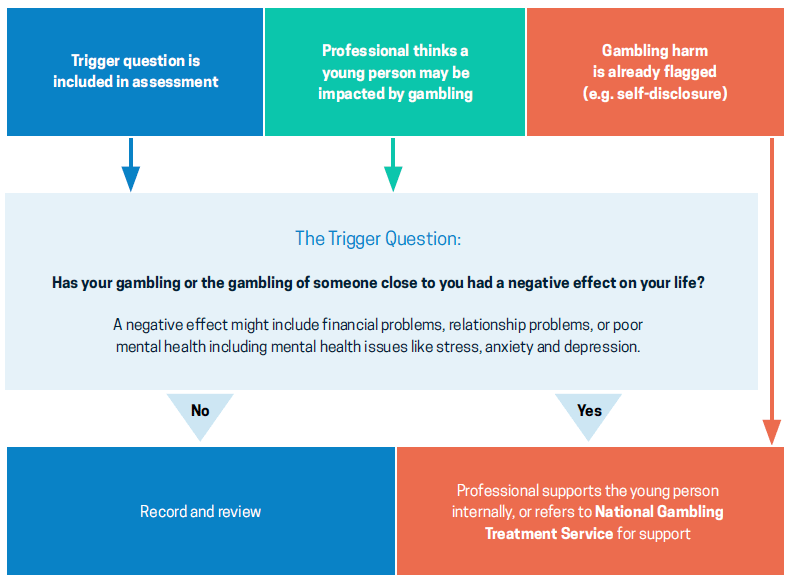2.3 Risk factors for experiencing gambling harm
All gambling products carry an element of risk. However, gambling products with certain characteristics are more likely to cause harm:1
- High speed
- High event frequency (i.e. short time gap between games)
- Repetitive
- Chance-based
- 24-hour availability
Products that are fast-paced, repetitive, and chance-based may increase some players’ experience of punishment (instead of reward). This can result in more persistent play, as the player tries to escape feelings of discomfort.
Products with a high event frequency, where players can stake money relatively quickly, also present a higher risk. Online slots, casino, and bingo are examples of these higher risk products.
Another higher risk gambling product is in-play betting.
In-play betting is betting while a live event is taking place.
Betting on live sporting events, like football or horses, also offers the opportunity for quick, repetitive betting and presents a higher risk of harm.
To minimise risk, people who gamble may choose to avoid products that feature these higher-risk characteristics. However, players who stick to lower-risk products may still receive ads and promotions designed to encourage them to try new, potentially riskier, gambling products. This is called cross-promotion, or ‘cross-selling.’
Cross-promotion is a marketing strategy that some companies use to promote other products while a customer is currently gambling. For example, “Bet £5 in a Sports Event, Get £5 Casino Bonus.”
A number of risk factors may also make an individual more likely to experience harm as a result of their own gambling. These include:
- Being male
In adults, men are more likely to experience harmful gambling (0.8%) than women (0.3%). In young people, boys are more likely to experience harmful gambling (2.0%) or be classed as ‘at-risk’ (3.8%) than girls (0.7% and 1.6% respectively).2 However, some reports indicate that the rate of disordered gambling may be rising faster in women than in men.3 - Being young
Young people in their teens to mid-twenties are at a higher risk of experiencing harm due to their gambling.4 For more details, see ‘How gambling harms affect young people.’ - Living in a deprived area
People living in the most deprived areas of Scotland are 6.9 times more likely to experience harmful gambling.5 21% of gambling premises are in the most deprived areas of GB, compared to just 2% in the least deprived areas.6 - Having family members or friends who gamble regularly
People experiencing harmful gambling are more likely to have a higher proportion of friends and family involved in gambling.7 - Being unemployed8
- Having experience of trauma
People who have experienced trauma in childhood (e.g. violence in the home or neglect) are more likely to experience gambling problems later in life.9 Gambling harms are also more common among people who have experienced life stressors during adulthood (e.g. intimate partner violence, homelessness).10 For more information on the impact of childhood trauma on the brain, see the UK Trauma Council’s resources. - Being from a Black, Asian, or minority ethnic community
People from ethnic minority communities are less likely to gamble, but more likely to experience harm when they do gamble.11 For example, 1 in 5 (20%) UK adults from ethnic minority communities are classified as being at risk of harm or currently experiencing harm due to their gambling. This rate is higher than in white adults (12%).12 - Being a person who has migrated to the UK
Similar to people from ethnic minority communities, migrants are also less likely to gamble, but more likely to experience harm when they do gamble.13 Migrating to the UK may mean moving from an environment where gambling was prohibited to one where gambling is more common and normalised. - Experiencing poor mental health
People with a gambling disorder are 5.9 times more likely to have poor mental health.14 - Substance use
Use of alcohol, tobacco, marijuana, and other drugs is associated with harmful gambling.15 - Having had a traumatic brain injury
People who have had a traumatic brain injury are 2.8 times more likely to experience harmful gambling.16 - Having a disability, such as ADHD or autism
Recent research has found that people experiencing disabilities such as attention deficit/hyperactivity disorder (ADHD) or autism spectrum disorder (ASD) are more likely to experience disordered gambling.17 - Low educational attainment
People with a lower level of educational attainment are 2.4 times more likely to experience a gambling disorder.18
Gambling harm can be prevented, and is not inevitable. The fact that gambling harm affects the health and wellbeing of specific population groups more than others means that it is a form of health inequality.
Health inequalities are unjust and avoidable differences in people’s health across the population and between specific population groups.19
Identifying people who may be experiencing harm as a result of their gambling
There are several ways of identifying people who may be experiencing gambling harms. A person may have a higher risk of experiencing harm as a result of their gambling if they answer yes to any of ‘The Three Questions’:20
- Have you ever tried to stop, cut down or control your gambling?
- Have you ever lied to your family, friends or others about gambling or how much you spend on gambling?
- Do you spend a lot of time thinking about gambling or future gambling?
If you use assessments as part of your practice, consider including ‘The Trigger Question21’ to identify people who have experienced gambling harms, whether due to their own gambling or as affected others:
- Has your gambling or the gambling of someone close to you had a negative effect on your life?
Figure 11 illustrates an example referral pathway when using The Trigger Question in your organisation’s assessments.

Source GamCare 2020
Figure 11: Example referral pathway using The Trigger Question
A set of questions used to identify a person experiencing harm as a result of their gambling is called a ‘problem gambling’ screen.22’
The two most common screens in the UK are the Diagnostic and Statistical Manual of Mental Disorders (DSM-IV) and the Problem Gambling Severity Index (PGSI). These screens have scoring systems for behaviours that might indicate that a person who gambles is at risk of experiencing harm, including:
- Being preoccupied with gambling
- Needing to gamble with increasing sums of money in order to achieve the desired excitement
- Being restless when attempting to cut down on gambling
- Gambling as a way of escaping from problems or relieving depression
- Returning – after losing money gambling – another day in order to get even
- Lying to family members or others to conceal the extent of involvement with gambling
- Often spending more money on gambling than intended
- Committing antisocial or illegal acts in order to finance gambling
- Falling out with family, truancy from school, or experiencing disrupted schooling because of gambling
Common fallacies
Fallacies, or cognitive distortions, are irrational beliefs and wrong ideas. Some fallacies are common amongst people who gamble, and believing in these fallacies may increase a person’s risk of experiencing gambling harm.23 These include:
Illusion of control
The illusion of control is when you believe that you control an outcome that is uncontrollable. Attributing success to skill and failure to bad luck is a misleading thought process that is common in many people, and not just amongst people who gamble.
‘The gambler’s fallacy’: Random events are not influenced by past history
In most real-life situations, history helps us predict the future, so people tend to look for patterns and expect events to be predictable. However, dice, roulette wheels, slot machines, bingos and lotteries are all random events: the outcome of these games cannot be predicted or influenced by the players.
Normalising behaviour
People experiencing harmful gambling may overestimate the number of people who behave as they do, thinking “lots of other people gamble just as much as I do, so it can’t be that bad.”
Confusing ‘often’ with ‘memorable’
Wins are memorable because they tend to be larger and more exciting, though less frequent, than the smaller, more regular losses. People who gamble may remember their wins better than their losses, and therefore believe that they are ahead when they are actually losing.
Superstitions
Some people who gamble mistakenly believe they can improve their luck by repeating superstitious habits falsely connected with past wins, e.g. wearing the ‘lucky t-shirt’ or playing their ‘lucky numbers.’
Ignoring the odds
People who gamble may ignore that the house edge makes it mathematically unlikely to win in the long term. For example, you might buy lottery tickets because you know of someone who has won, yet you don’t realise that it took 30 billion tickets (more than 4 times the earth’s population) to produce 2,000 winners.
Forgetting the law of averages
The more times something happens, the closer the average result will be to its true odds. It is not unusual to flip a coin twice and to get heads both times. However, it’s very unlikely for heads to come up ten times in a row. Although short winning streaks are common, long winning streaks are extremely rare. People who appear to win more frequently than other people—who seem luckier—have usually just played more often. They also have more frequent losses than other people, but they don’t brag about the losses!
Early wins and occasional rewards encourage false hopes
Most commercial gambling enterprises understand this principle, so they offer infrequent large wins and frequent small wins. The player will then keep gambling in the hope of hitting a big win, ignoring the true odds of the game and the presence of the house edge, which means the player loses over the long term. Many people experiencing gambling harms had the misfortune of a big win when they first started to gamble.
Money does not solve all problems
People who win the lottery tend to be very happy for the first year, and then return to their previous level of happiness. Many people who gamble mistakenly believe that if they become rich, their problems will be solved and they will be forever happy.
